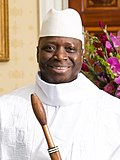| ||||||||||||||||||||||||||||
48 of 53 seats in the National Assembly 27 seats needed for a majority | ||||||||||||||||||||||||||||
|---|---|---|---|---|---|---|---|---|---|---|---|---|---|---|---|---|---|---|---|---|---|---|---|---|---|---|---|---|
| ||||||||||||||||||||||||||||
 |
|---|
Parliamentary elections were held in the Gambia on 29 March 2012. [1] The ruling Alliance for Patriotic Reorientation and Construction (APRC) won 43 of the 48 elected seats. [2] Most opposition parties boycotted the election. [3]
Contents
These were the last parliamentary elections held during the rule of president Yahya Jammeh.

